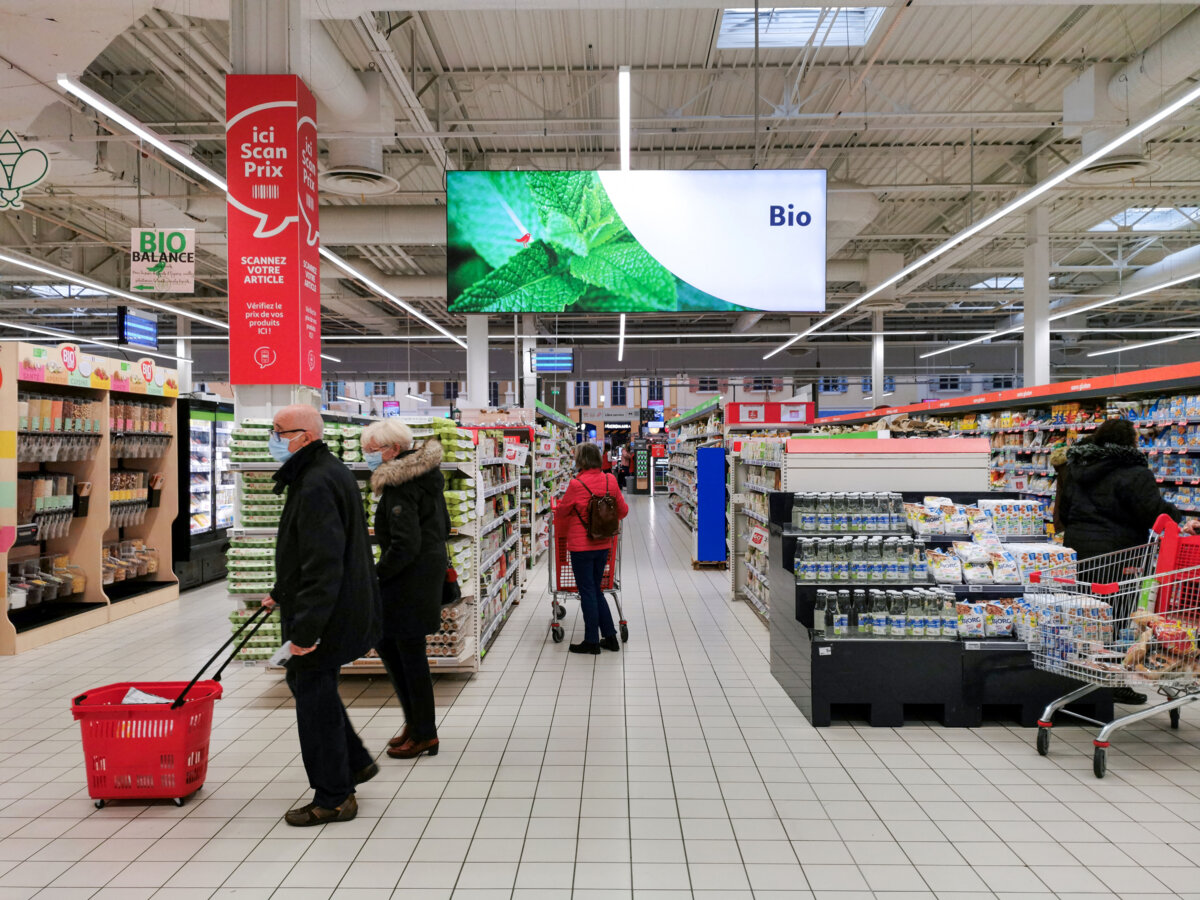The food chain in France, from the production process all the way through to it landing on plates for consumption, is officially estimated to produce around 22% of the country’s greenhouse emissions, in third place behind transport and housing.
Around 70% of food purchases in France are made in outlets belonging to the major supermarket chains, according to 2019 statistics published by the sector’s representative federation, the FCD, giving them a potentially powerful role in contributing towards public policies for reducing carbon emissions.
Earlier this month, the Réseau Climat Action, the French branch of the Climate Action Network, the international umbrella group for hundreds of environmental protection NGOs, published a study it carried out among supermarkets managed by eight of the major French retail groups, in which they were measured, using around 40 criteria, over their part in reducing, or not, greenhouse gas emissions.
These included whether they promoted consumption of the produce of intensive farming, or that of short supply chains, of organic food, vegetables and vegetable-based products or of meat (an estimated 80% of meat and charcuterie purchases are made in supermarkets). The Réseau Climat Action (RCA) study marked the eight retail chains (Auchan, Carrefour, Casino, Intermarché, Leclerc, Lidl, Monoprix and Système U) on a scoresheet of 20 points, the maximum representing best practices. Around 20 supermarkets from each chain, all situated in urban or peri-urban areas, were inspected by volunteers from local Greenpeace France branches.
The overall average score came to a disappointing 7.25 out of 20 points, the worst of the class being Leclerc, the largest in the sector, which was given 5.8 out of 20.

Enlargement : Illustration 1

To meet climate change goals, and notably the 2015 Paris Climate Accords objective of limiting global warming to 1.5% above pre-industrial levels, numerous experts, including the United Nations Intergovernmental Panel on Climate Change (IPCC), argue for a significant reduction in the consumption of animal-based food produce.
But the RAC study, published on February 2nd, noted: “The large retail chains are putting a brake on the transition towards sustainable food [supply] by inciting overconsumption of meat and dairy produce coming, for the vast majority, from intensive production practices.” It found that, across all the supermarkets tested, 92% of pre-prepared meal packs contained meat or fish.
Among the numerous recommendations of the RAC study report, one was for the introduction of limits on the large profit margins of the retail chains on organic food sales. A report published by French consumer protection association UFC-Que Choisir and cited by the RAC, found that 46% of the surcharge of organic produce in supermarkets as compared to non-organic produce, was down to the profit margin of the retailers. One example given was the cost of organic apples, bought from producers at 1.8 euros per kilo and sold to consumers at 4.19 euros per kilo.
“On average, the gross margins on fruit and vegetables are twice as high (96%) for organic [produce] than conventional [farming produce],” said the RAC, which underlined that the practice “renders this produce even less accessible for modest-income households”.
“In general, the [profit] margin is reduced by a maximum on ‘loss leaders’, like a jar of Nutella or a bottle of Coca-Cola, in order to propose low prices and to draw clients into the store,” the report added. “On the opposite, the supermarkets have a tendency to apply the greatest margins on products for which the consumers do not have comparative elements to hand, or on products that carry a label of quality, like organic and ‘Label Rouge’ products.”
Precise data on the greenhouse gas emissions of the major retailers is difficult to obtain, explained Benoît Granier, who directed the RAC study. “Only half of the major retail groups publish the totality of their emissions, including those from the production of food items on sale,” he told Mediapart, whereas his report estimates that the latter account for 95% of emissions. “For a very long time, public policies did not exercise any particular pressure on the major retailers concerning their [greenhouse gas] emissions.”
None of the retail groups publish complete data on the share in their overall sales of produce from sustainable farming or ‘Fair Trade’ commerce, which Granier said was in part because “some data is part of business secrecy”.
While the RAC report warns that, “to reach carbon neutrality in 2050 and to limit climate change to 1.5°C, it is urgent that that French supermarkets adjust their objectives”, just three out of the eight retail chains in question – Auchan, Carrefour and Casino – have committed themselves to reducing Scope 3 emissions. The study said Carrefour is the most ambitious in this, with the pledge of reducing Scope 3 emissions by 29% by 2030.
“While the objectives of these three groups are commendable, they are not aligned on the commitment by France to reduce its emissions by 40% by the horizon of 2030, and all the more so given that that commitment will soon be raised higher following the aim of a 55% reduction by 2030 adopted by the European Union in 2022,” the report noted.
-------------------------
- The original French version of this article can be found here.
This abridged English version by Graham Tearse


